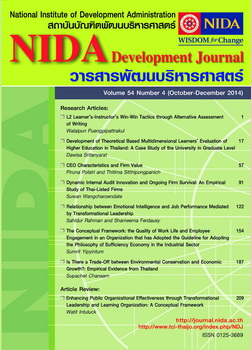Relationship between Emotional Intelligence and Job Performance Mediated by Transformational Leadership
Main Article Content
Abstract
The present study aims to examine whether emotional intelligence was related to job performance and the potential mediating role of transformational leadership in this relationship. Emotional intelligence was measured by the Emotional Quotient Index (Rahim et al., 2002) while job performance was assessed by Tsui et al.,’s (1997) Job Performance Scale. Additionally, transformational leadership was measured using the Multifactor Leadership Questionnaire (Bass & Avolio, 2000). Data for this study were collected from 176 working MBA students who were asked to rate their managers’ emotional intelligence, job performance, and transformational leadership behaviors studying at three private universities in Chittagong, a port city of Bangladesh, with the help of printed survey instruments. In data collection, this study used convenience sampling technique. Data collected were analyzed using descriptive statistics, bivariate correlation, and hierarchical regression analysis. Results indicated a positive correlation between emotional intelligence and job performance, when the effects of age, gender, education, position, and organization were held constant. Additionally, using a series of hierarchical regression analyses, transformational leadership was found to fully mediate the relationship between emotional intelligence and job performance. An important implication of the study is that managers should focus on increasing their levels of emotional intelligence. The most important limitation was to use cross-sectional and non-experimental data that might limit the generalizability of the results. Future research directions are also discussed.

